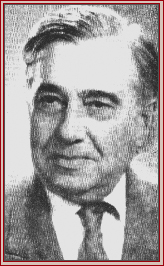Nikola Obreshkoff
| Born:
March 6, 1896 Varna, Bulgaria Died: August 11,1963 Sofia, Bulgaria Biography Bibliography Centennial Symposium |
 |
The eminent Bulgarian mathematician Nikola Obreshkoff was one of eight children in the family of a military colonel. He graduated from the University of Sofia, became Doctor of Mathematics at the University of Palermo, Italy, in 1932, and Doctor of Sciences at the Sorbonne in Paris in 1933.
Obreshkoff left an enormous scientific inheritance of more than 250 scientific papers, four monographs and several textbooks. He had a wide scope of research interests in classical algebra, theory of numbers, mathematical analysis, theory of probability and mathematical statistics, integral geometry, topology, equations of mathematical physics, mechanics. In his youth he discovered a remarkable extension of the classical Descartes' Rule of Signs for complex roots of real polynomials. Later he became known far and wide for his seminal work on the summation of divergent series.
Another summit of Obrashkoff's creative work was in the difficult but challenging field of arithmetics, now called diophantine analysis. He found the exact value of Borel's constant and proved that it is equal to 1 - and that happened fifty years after its formulation.
From the memoirs of the Bulgarian mathematician Ljubomir Iliev: "Obreshkoff had a phenomenal taste for essential and deep problems. For the solution of such a problem he always searched an original, direct, and possibly the most elementary approach. He facetiously called such a method his 'knack'."
With the
assistance of the Institute of Mathematics and Informatics,
Bulgarian Academy of Sciences, 2006
Bulgarian Academy of Sciences, 2006